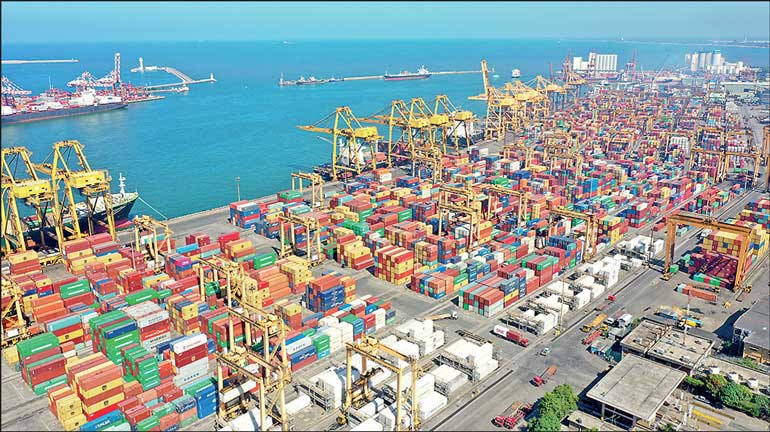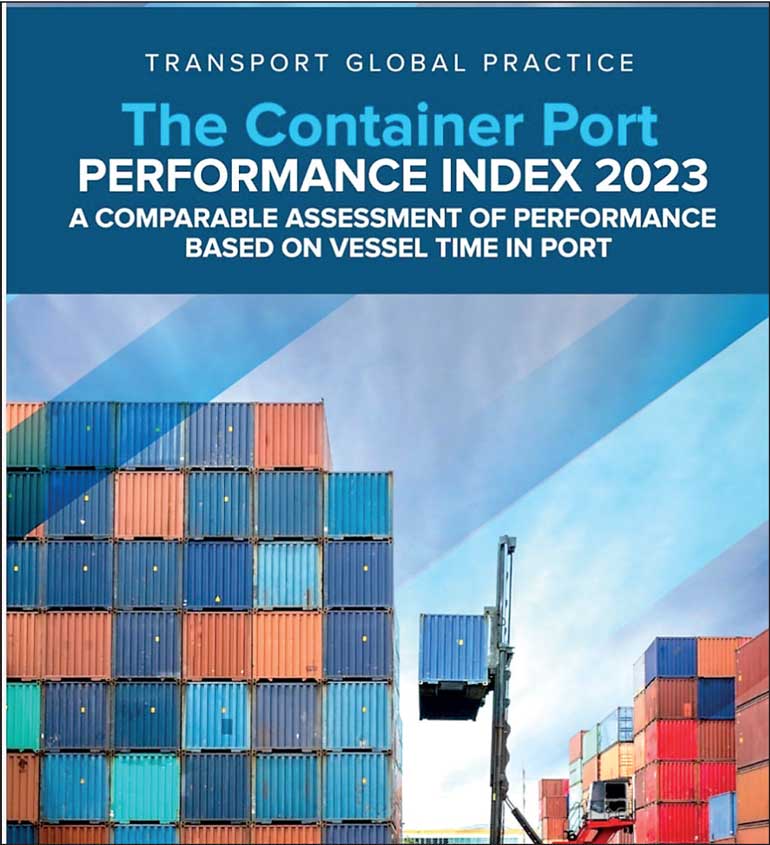Wednesday Feb 25, 2026
Wednesday Feb 25, 2026
Monday, 1 July 2024 00:00 - - {{hitsCtrl.values.hits}}


By a Special Correspondent
Ask anyone in the shipping, logistics and the academic field and they will tell you that Sri Lanka has lost out many opportunities to uplift its shipping and logistics industry over the last two and a half decades. The Port of Colombo should have been handling 15 million containers instead of the 7 million boasted by the politicians and contributing at least 8% GDP instead of 2%.
The country has lost opportunities since the mid-1990s when the global giant Maersk wanted to invest in a terminal in Colombo. The then Chandrika Kumaratunga Government ignored this request and instead spent millions of dollars on a dead port “Olluvil international port”, which is a sand dune today. Maersk who was to invest in Sri Lanka, went and built competition in Salalah, Oman to the west of Sri Lanka and the West Port in Malaysia to the east of Sri Lanka. These are two massive successful transhipment hubs that compete with Colombo to date. After this shock, a few years later, CBK Government decided to privatise Queen Elizabeth Terminals in Colombo which is one of the most efficient in South Asia known as SAGT. In 1996 Colombo harbour was not dredged to capacity requirements and was late by five years and lost millions of dollars in revenue as the then 6000 TEU vessels could not enter Colombo port.
Then again Sri Lanka lost out by delaying the South harbour by ten years as it was to be built by 2003. Next was the delay in building East Container Terminal, which has resulted in shortage in ship and yard handling capacity, where Colombo today has significantly fallen behind its capabilities and as per the World Bank’s latest report on Port Performance Index and has fallen 12 positions from 28th to 40th in 2023. At the same time, for the last two decades, since the PPP of SAGT Sri Lanka has failed to attract global terminal operators or global shipping lines that have the networks and capital along with know-how to transform Sri Lanka to a real maritime and a logistics hub.
Instead of attracting global players, by playing short sighted politics, leading into corruption and inefficiency, Sri Lanka has only managed to work on Government-to-Government projects in the recent past, which includes the Colombo West International Terminal development with India bringing in Adani Group and has technically moved away from PPP policy in the East Container Terminal and has surprisingly included terms to stop shipping lines investing until certain targets are met by the existing operators.
This should not be the way global competition happens in a transparent way. We should be open for competing investments coming in from multiple sources, which includes the giant shipping lines themselves, who are the actual decision makers in ports of call and our customers, who are now also getting into backward integration with billions of dollar investments into terminals and logistics operations. Pragmatic Governments around the world are converting ports into multi-user facilities with public-private partnerships and increasing landlord modals with private investments, such as the Jawaharlal Nehru Port in India.
Backward step of reversing its own progressive reforms
It was towards the end 2017, that the Ranil Wickremesinghe/Sirisena Government took the backward step reversing its own progressive reforms proposed in the port sector. The late Mangala Samaraweera as the then Finance Minister, under the Prime Ministership of Ranil Wickremesinghe, had to battle his own Government on two key reforms. First being the East Container Terminal that was to be operated by a consortium of global terminal operators, shipping companies together with SLPA and a local investor. This was reversed by President Sirisena overnight, when four bidders were finalised by the cabinet, and the East Container Terminal as a result after 7 years is still under construction when it was originally planned to be operational by 2017. The lost business for the country and its image and investor confidence runs into billions of dollars.
Then the second progressive reform was to liberalise the shipping and logistics sector 100% to attract global capital and investments. This was a budget proposal passed in Parliament. However, late Managala Samaraweera was cornered by few local lobbyists, entertained by politicians who benefited through their contributions and fake nationalism. Since then, Sri Lanka has failed to attract any major global logistics investors with critical capital infusion and a closely guarded circle of people through obvious deal makings has successfully stopped the shipping and logistics sector being fully liberalised although the world bank and the IFC too have repeated this need, and the port sector also remain under the control of the vested interests in many fronts including persons with conflicts of interest acting as board members and advisors. Industry sources also say that corruption is rampant at all levels at the port.
Failing to capitalise SL’s geographic advantage
Not only Sri Lanka has failed to capitalise its geographic advantage, but it has failed in terms of investment, reforms and as a result its competitiveness is drifting away, and new challenges are popping up around the island as all the major maritime economies are fully opened for investment in the shipping and logistics sector. The international agencies, such as the World Bank, have been monitoring the port performance index and logistics performance index and it seems our leaders are ignoring what is written on the wall. Before the economic collapse too, our leaders were ridiculing the rating agencies, and the result was a bankrupt country. If the port and the logistics sector is similarly ignored for political and protectionism of a few, it might not be far away that the port sector will pay a heavy price and will seriously affect our export sector’s competitiveness further.
Interestingly the protectionism is so strong, if one digs into the structure of the Sri Lankan shipping and logistics industry, it violates the European competition laws and the US Federal Maritime Commission laws openly. A strong Duopoly model is strangling the market with indirect anticompetitive practices which is also harming the SME exports sector growth. Sri Lanka also ranks 104 out of 125 developing and least developed countries in its progress towards implementing the Trade Facilitation Agreement-TFA.
It is vital that if good governance and better economic prospects are envisaged to uplift the sector to help the country recover faster from its economic crisis, protectionism is not going to help Sri Lanka. The IMF and donor countries should recommend reforms to this sector, just as it has done to the energy and the electricity sectors. It is hoped some sanity will come with the economic transformation bill, otherwise the country will pay its ultimate price on the maritime and logistics aspirations.